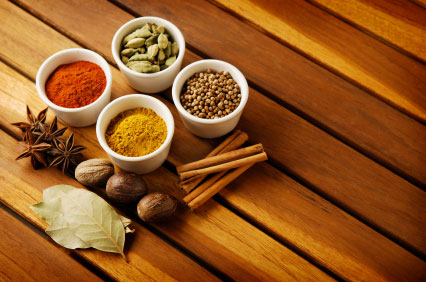Antioxidant Herbs and Spices

The World's Best Antioxidant Spices
Spices are a delicious way of adding a sumptuous richness to many recipes. Could there be more to these tasty spices and herbs than meets the tongue? Research is now showing that many of the world’s most commonly-used spices are also chock full of health-promoting antioxidants. While most people commonly think of pomegranates, berries and leafy greens as holding the most antioxidants, knowing that spices have antioxidant levels comparable to many popular “super foods” will allow us to season our foods with more awareness. This article offers a “best of” list of the world’s healthiest antioxidant spices, as well as some quick ideas on how to incorporate them into your next meal.
The Best Antioxidant Super Spices for Improving Your Health
Cinnamon- Quite possibly the world’s most powerful antioxidant spice, cinnamon’s unique protective properties stem from the essential oils found in its bark. Cinnamon inhibits unhealthy clumping of blood platelets, lessens inflammation, and acts as an "anti-microbial" food.
Ginger- This antioxidant has a diaphoretic, carminative effect on the body. It also acts to increase circulation and digestion, and has been used in many cultures for hundreds of years to treat digestive upset and food poisoning.
Oregano- Contains antimicrobial and anti-inflammatory capacities, and may help fend off colds, the flu, and inflammatory bowel disease.
Red Peppers- Spices derived from red peppers like cayenne and paprika are effective as a circulatory stimulant and a topical pain reliever.
Rosemary- A well-known antiseptic, rosemary also acts as a memory booster because it increases levels of oxygen-rich blood to the brain.
Marjoram- Great for preventing the growth of bacteria, one of the highest levels of antioxidants comes in this tasty spice!
Thyme- This tasty herb is full of a thymo-rich essential oil which exhibits antiseptic and antibacterial qualities.
Garlic- A crucial antioxidant for cancer prevention, cardiovascular diseases, and high cholesterol, garlic also helps prevent common diseases of the respiratory and immune systems.
Turmeric- Turmeric’s powerful anti-inflammatory properties act as a strong pain reliever, as well as a valuable treatment for arthritis, Alzheimer’s disease, and even multiple sclerosis.
Clove-These unopened flower buds of the evergreen clove tree contain a variety of flavenoids which contribute to clove’s anti-inflammatory and powerful antioxidant properties.
Parsley- Just a sprig will do! In high amounts, this spice is so powerful that it can induce labor in pregnant women, as well as cause heightened skin photo-sensitivity. Rich in vitamins, parsley’s flavenoids have anti-inflammatory properties and has been shown to inhibit tumor growth (especially lung tumors) in animal studies.
Basil- Known for its anti-cancer, anti-viral and anti-microbial actions, this aromatic herb may also be used to treat inflammatory bowel disease.
Cumin- one of the world’s most frequently used spices, it is extremely high in antioxidant-rich essential oils.
Mustard Seed- the most pungent varieties contain an anti-cancer compound called sinigrin. It has been suggested that this compound may specifically prevent colon cancer.
Spicy Statistics
Did you know that half a teaspoon of dried oregano has the same amount of antioxidants as a quarter cup of almonds? And that same amount of oregano has the same antioxidant punch as nearly four cups of fresh spinach!
Studies show that curcumin, the part of turmeric that gives it its vibrant yellow color, may engage one the key enzymes involved in protecting the brain against cellular oxidation. This brain oxidation is believed to be a major cause of neurodegenerative diseases, as well as aging in general.
A recent study from the International Journal of Food Microbiology found that cinnamon's antimicrobial properties were so strong that it could be used as a natural form of food preservative, inhibiting the growth of many food-borne pathogens.
Easy Tips on How to Boost the Amount of Potent
Phytonutrients at Mealtimes Sprinkle some cinnamon on your popcorn or corn chips! It’s a surprisingly delicious way to add some antioxidants to your everyday snacks.
Add a luxurious (and healthier!) antioxidant-packed twist to common corn on the cob by rubbing with olive oil and cumin, marjoram or oregano instead of the typical salt and butter.
Ditch your usual salad dressings from a bottle. Try making your own tasty oil vinaigrette using basil, thyme, garlic, marjoram and oregano.
One of the easiest and best antioxidant rich salads is simply a sliced tomato covered in fresh basil leaves, a splash of olive oil and a pinch of salt.
Add some fresh cream to a bowl of seasonal blue berries and top with a hearty sprinkling of cinnamon and ginger for a delicious dessert.
Have some turmeric in your tea! Try making a Chai tea by adding cinnamon, nutmeg, ginger and a dash of turmeric to your milk. This colorful, spicy tea will act as a strong antioxidant beverage.
References and Other Resources:
- Tsai, Tzung-Hsan et al., "Antioxidant and Anti-inflammatory Activities of Several Commonly Used Spices," Journal of Food Science, 2005, vol. 70, no1, pp. C93-C97 (37 ref.)
- Shakila, R.J., et al., "Inhibitory effect of spices on in vitro histamine production and histidine decarboxylase activity of Morganella morganii and on the biogenic amine formation in mackerel stored at 30 degrees C.," Z Lebensm Unters Forsch, 1996, 203:71-6
